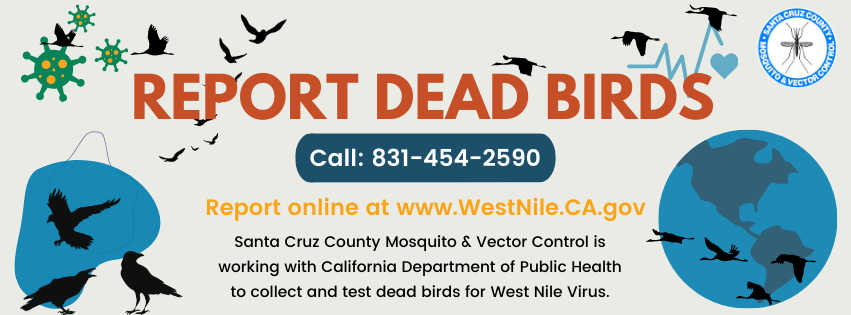Dead bird reports are often the first sign that West Nile Virus (WNV) is active in an area, and the reports help track WNV throughout the year. Wild birds are the main source of WNV for mosquitoes. If a mosquito bites an infected bird, it can become infected and pass the virus on to people or other animals it bites. Not all birds that are infected with WNV will get sick, but WNV can make some birds very sick cause death. Signs of WNV in birds may include uncoordinated movement, a lack of energy, and difficulty breathing. Corvid birds (such as crows, jays, ravens, and magpies) are the most likely to get sick and die from WNV.
What happens when you report a dead bird?
If you call the hotline, a California Department of Public Health (CDPH) staff member will take down information about the bird. If you submit a report online, the CDPH may call you for additional details. The CDPH determines if the bird is ‘testable’ – depending on the condition of the carcass and whether it is a species likely to have died from WNV. The CDPH shares the information with Santa Cruz Mosquito and Vector Control Department. Staff will be sent out to collect the bird and bring it back to the lab for testing, if appropriate. If the bird tests positive for WNV, the District conducts additional surveillance activities in the area including more trapping and source checking.
Safety First!
Never touch a dead animal directly with your bare hands. Use a shovel or disposable gloves when moving dead birds. Always wash your hands thoroughly after handling a bird. Do not bring dead birds indoors.
The bird must have been dead less than 24 hours. If you are not sure if the bird you have found is less than 24 hours old, look for the following clues:
- The bird should not be stiff
- There should be no ants or flies on the bird
- The bird should not have a foul odor
- No missing body parts
- No physical injuries
- Eyeballs must be intact (disease testing requires bird eye fluid)
To learn more about WNV, visit https://westnile.ca.gov/faq.php
